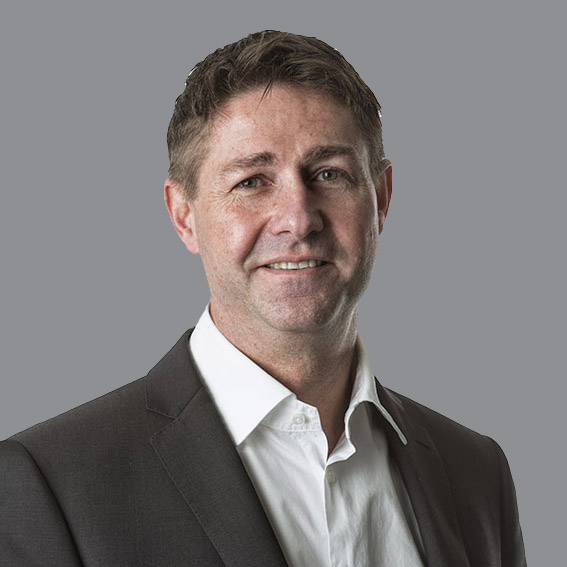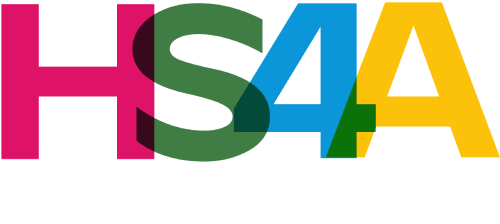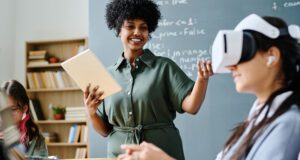How to Empower Educators and Students for Social Transformation Through the Concept of Human Security
- By Grant Schreiber
One of my best quotes about teaching is by Colleen Wilcox, a Superintendent of Schools in San Francisco in the 1970s, who said: “Teaching is the greatest act of optimism.” What she meant was that in teaching, you must be willing to take whatever comes your way, and with open arms, accept any obstacles thrown at you for the betterment of your students. And we certainly find ourselves facing many obstacles today.
We are living in an era marked by unprecedented challenges and incredible opportunities, and the role of education today is not only about shaping young minds but also shaping the path of our collective future like never before. In a globalized world, what you teach in India today, can influence policy and leadership around the world tomorrow. There is no way of knowing what a student in your classroom might become tomorrow, and how they might influence very big events in the future. We’ve seen young people from many developing countries on the world stage, talking to world leaders, leading social change, and influencing policy. We should not be surprised by this anymore, and realize that educators can be the place where this all begins.
The first question people ask me is – “What is human security” Human security goes beyond traditional notions of security, encompassing not just physical safety but also addressing economic, social, environmental, and political factors that contribute to overall well-being. It’s a holistic approach that recognizes the interconnectedness of our global community.
Educators are the architects of tomorrow’s world. As torchbearers of knowledge, you have the profound responsibility of shaping the minds of our young people. Your influence transcends textbooks; it extends to values, beliefs, and the critical thinking skills that will one day mold individuals into responsible citizens.
Nurturing Collaboration in the Classroom
In many countries children are not encouraged to speak up or have an opinion. Yet for social transformation to be effective through the human security approach, new strategies need to be adopted. We should be asking how teachers can maintain their authority in the classroom, while at the same time encouraging free expression and empowerment of young minds. We should explore how teachers can facilitate and collaborate with students to spark social transformation.
Collaboration may even become a necessity in some parts of the world, such as in sub-Saharan Africa, where the teacher shortage is particularly acute. Some countries having teacher-to-student ratios of one teacher to 100 students, or even higher. One teacher cannot possibly deliver a quality education with such a skewed relationship. This is where creating group discussions around real-world issues and current events can empower students to seek answers and solutions beyond their immediate surroundings.
Let’s talk about the heart of this transformation: our students. They are not just recipients of knowledge but active agents of change. To empower them, we must provide them with the tools to think critically, communicate effectively, and act responsibly. Beyond academic excellence, students need to be aware of the world’s complexities, become empathetic towards diverse experiences, and learn how to be resilient in the face of adversity. We are entering a phase of history where we can be guaranteed of regular crises — social, environmental, and political. How will we prepare students with coping mechanisms that go beyond the academic? A human security approach is one such solution.
Many great leaders in history have realized that you cannot lead others effectively, before you’ve learned how to lead yourself. Human security is focused on the individual first, in an effort to strengthen that person enough to help others.
Project-based learning, community engagement, and exposure to real-world challenges can help students apply their knowledge meaningfully. Encouraging them to explore their passions, express their opinions, and engage in constructive dialogue fosters a sense of control over their actions — and also the consequences. When students realize that their voices matter, they can become catalysts for positive change.
Embrace Life-long Learning
So how can educators empower themselves for this monumental task? One way is by embracing lifelong learning. As the world evolves, so must our teaching methods and our content. The 21st-century classroom is dynamic, inclusive, and diverse. Continuous professional development equips educators to tackle sensitive issues, foster empathy, and cultivate respect for all viewpoints.
Achieving human security starts with people — their needs, their hopes, their challenges and desires. These can vary considerably across communities and between individual’s, so they must be carefully understood, including in how they are connected. Today’s security threats travel the globe quickly and affect us all personally, setting off a chain of events that can endanger our health, our safety and ability to meet our basic needs.
Today we are seeing that we are all truly connected — a farmer who lives nowhere near the sea can be affected by storms that originate thousands of miles away, in an ocean being affected by global warming. Polluted air from countries in which we don’t reside can make its way to our cities, as seen in New York recently, where Canadian wildfires made the air quality in New York the worst in the world for a few days. The world’s oceans feed us all, but we can become poisoned by a country we’ve never visited — that has dumped nuclear waste, plastic, or oil into the ocean thousands of miles away — that makes its way into our food chain. The air we breathe, our oceans, and viruses don’t recognize international borders.
Change Begins with You
Solutions to assisting people and beginning the healing of our planet begin with strong individuals, who in turn create strong families, communities, cities, and countries. True security should be grown from the inside out, not by throwing a military ring of fire around a country and hoping for the best. The next generation of learners should realize that security begins with them, and by thinking critically about the world around them, they can start building resilience to these risks — starting with the places they live. Building self-esteem among young people to allow these bold solutions to emerge is critical for ensuring their success later in life, and in promoting a more interconnected, empathetic, and violence-free world.
Some practical solutions for human security have already been implemented in schools around the world. Here are some examples:
Around Conflict Resolution: The “Peaceful Schools Program” implemented in New Zealand schools encouraged students to learn conflict resolution skills and foster a positive school climate. Students were taught techniques to manage conflicts peacefully and create a safer learning environment.
On Cybersecurity Training: The “Cyber Security Challenge for Schools” in the United Kingdom offered cybersecurity competitions and workshops to students, raising awareness about online safety and taught them how to protect themselves from cyber threats.
On the Environment: The “Eco-Schools” program, established in the 1990s, operated in over 67 countries. Schools involved in this initiative focused on topics like waste reduction, energy conservation, and biodiversity to educate students about environmental sustainability.
On Health Education: The “Teen Outreach Program” in the United States integrated health education with community service, providing teenagers with information about sexual health, substance abuse, and mental health while promoting volunteerism.
Around Disability Inclusion: The “Inclusive Education Project” in Ghana aimed to integrate children with disabilities into regular classrooms. This initiative not only provided education for children with disabilities but also raised awareness and fostered understanding among their peers.
Human security depends on empowering people to participate in making choices about how they can be more secure, now and over the longer term. This is where the Human Security for All campaign can help start the conversation. By nurturing discussions that look critically at the state of the world, we hope to spark lively conversations about what human security means to each of us. There is no right or wrong answer, as human security means different things to different people.
Solutions Already Exist, You Just Need to Find Them
Nurturing a worldview is so important today. Solutions to many of the problems we see around us have been solved in other parts of the world, but we sometimes we never get to hear about it. Asking students how they might solve a problem on the other side of the world can sometimes give unexpected results. Being removed from that particular problem can empower young people to look at it from a distance, without emotion and come up with surprising suggestions. Sometimes being too close to a problem means that you don’t see it. Young people in another country may already have confronted this problem and found a solution.
Nurturing self-belief and confidence in young people is key in taking these first steps. Because educators and teachers are usually the first people around when young people take these first steps, you have a critical role to play that goes beyond curriculum and the teaching of skills. You are building human beings that must learn how to work together, resolve conflicts and think differently when trying to solve a problem. Problem-solving will increasingly become a skill that needs to be taught in schools, as the next generation faces, social, environmental and political issues like never before.
Human security provides the nurturing environment necessary for effective education. It ensures that individuals, regardless of their background, have access to education, healthcare, clean water, and economic opportunities. Without these basics, the potential for growth and transformation remains unrealized.
Moreover, human security reinforces the value of diversity and inclusion. An inclusive classroom is a microcosm of an inclusive society and by fostering an environment where every student feels valued and respected, we sow the seeds of understanding and cooperation that are essential for social transformation.
Use Technology and Digital Tools
In the digital age, technology is both a blessing and a challenge. As educators, you have the privilege of harnessing technology’s power to transcend boundaries and amplify your reach. Virtual classrooms, online resources, and digital collaborations have democratized education like never before.
However, the digital divide persists, and with it comes the risk of cyberbullying, misinformation, and privacy breaches. As we embrace technology, we must also educate students about responsible online behavior, digital literacy, and the ethical use of information.
Empowering educators and students for social transformation through human security is not a solitary pastime. It requires collaboration among your peers, governments, NGOs, educational institutions, and the private sector. By pooling resources, sharing best practices, and aligning our efforts, we can create a multiplier effect that magnifies our collective impact.
Reframing Education
Imagine a world where education is not just a means to secure a job, but a vehicle for creating a more just, equitable, and compassionate society. A world where students grow up understanding that their well-being is intertwined with the well-being of others — wherever they might be in the world.
Let us remember that education is not a static process; but rather a dynamic force that shapes our present and molds our future. By empowering educators and students with the principles of human security, we enable them to become architects of a world that is safe, just, and sustainable.
Each one of us has a role to play. Educators, must continue to inspire and innovate. Students, must learn how to embrace their potential to effect change. So together, let us champion human security as the cornerstone of education, and allow it to to propel us towards a brighter, more harmonious tomorrow.

Grant Schreiber is Global Campaign Manager for the Human Security For All campaign — a campaign of The United Nations Trust Fund for Human Security and The World Academy of Art and Science in collaboration with an international network of NGOs, events, and private sector supporters. He has founded multiple companies in South Africa, the UK and USA, each centered around a prominent social cause, aligning an entrepreneurial spirit with impactful change, and weaving purpose into every venture.







